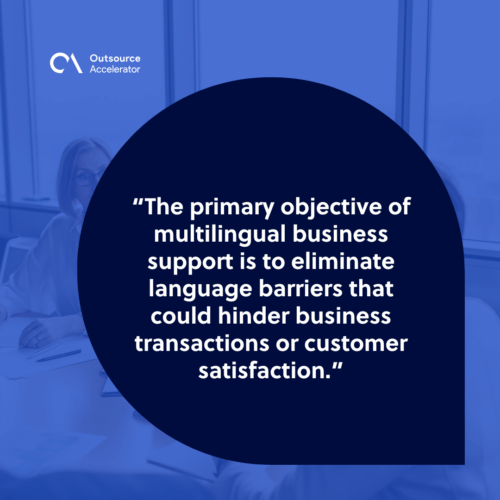Accessing global potential through multilingual business support

With the world continuing to hurtle towards greater levels of interconnectivity, businesses are no longer confined by geographic boundaries.
Effective communication across languages is critical, whether it’s for selling products, offering services, or collaborating with international partners.
Multilingual business support plays a large role in bridging linguistic and cultural gaps, enabling businesses to thrive in diverse global markets. By leveraging this specialized service, companies can enhance their operations and build meaningful relationships worldwide.
In the 518th episode of the Outsource Accelerator Podcast, Paul McManus of XTENSOS discusses how his company leverages their multilingual talent to engage customers.
The role of multilingual business support
Multilingual business support encompasses services and strategies designed to facilitate communication in multiple languages. These can include customer service, technical support, content translation, and cultural consultancy.
The primary objective is to eliminate language barriers that could hinder business transactions or customer satisfaction.
Multilingual business support works by ensuring that interactions with clients, partners, and internal teams occur in their preferred languages.

For example, a company entering a new international market might employ a multilingual customer service team to address queries from non-English-speaking clients.
Similarly, internal teams working on global projects can benefit from streamlined communication channels supported by skilled translators or interpreters.
This support often extends beyond language to encompass cultural nuances. This practice ensures that messages are not only understood but also resonate appropriately with different audiences.
5 Benefits of multilingual business support
Multilingual business support offers these key benefits:
1. Enhanced customer experience
Customers are more likely to engage with businesses that communicate in their native language. Multilingual support enables companies to provide personalized assistance, fostering a sense of trust and loyalty.
Paul points to this as a strength of a multilingual company like XTENSOS.
“There’s a lot of data that would support that people will buy more based on transactions in their own language.”
Whether answering questions or resolving complaints, this tailored approach significantly improves customer satisfaction.
2. Competitive advantage in global markets
Having multilingual capabilities sets businesses apart in competitive landscapes. Companies that cater to diverse audiences position themselves as more accessible and inclusive.
This attracts a broader customer base and gains market share over less adaptive competitors.
3. Improved internal collaboration
Global teams often consist of individuals from various linguistic and cultural backgrounds.
Multilingual support ensures that internal communications are clear and cohesive, reducing misunderstandings and enhancing productivity. It also fosters a more inclusive workplace culture.
4. Increased revenue potential
Reaching new markets often translates to higher revenue opportunities. By overcoming language barriers, businesses can tap into regions previously considered inaccessible, unlocking substantial growth potential.
5. Enhanced brand reputation
Businesses that invest in multilingual support demonstrate a commitment to inclusivity and customer satisfaction.
This dedication not only boosts brand image but also establishes the company as a global leader that values diversity.
Best practices for providing multilingual business support
Consider these best practices when implementing a multilingual business support model:
1. Identify key languages and markets
Understanding your target audience is essential. Begin by identifying the primary languages spoken in your current and prospective markets.
Prioritize languages that will have the greatest impact on your business growth.
2. Hire skilled multilingual professionals
Building a team of qualified multilingual employees ensures that your support services are effective and authentic. Look for individuals with strong language proficiency, cultural awareness, and relevant experience in customer-facing roles.
3. Leverage technology
Technology plays a vital role in multilingual business support.
AI-powered translation tools, multilingual chatbots, and customer relationship management (CRM) platforms equipped with language capabilities can streamline operations and reduce costs.
While technology cannot replace human expertise entirely, it can complement efforts to provide efficient and accurate support.
Paul takes this view as well, noting that “Just because you can automate some of these rules doesn’t mean you should.”
4. Provide comprehensive training
Invest in training programs that equip your team with cultural awareness and advanced communication skills. This is especially important for employees working in customer-facing roles.
Training should also focus on maintaining a consistent brand voice across languages.
5. Ensure quality and consistency
Accuracy is crucial when providing multilingual support. Use centralized glossaries, style guides, and quality assurance processes to maintain consistency in translations and communications.
Regularly review and update these resources to reflect any changes in your business or market.
Paul highlights this as partly what sets XTENSOS apart.
“Other people are focusing on the efficiency of it. We’re more focusing on the quality and broad usability.”
6. Embrace cultural sensitivity
Language is deeply tied to culture, and even small missteps can lead to misunderstandings.
Ensure that your messages are not only linguistically accurate but also culturally appropriate. This involves understanding local customs, idioms, and taboos.
Paul considers this a real benefit of multilingual agents.
“They’re able to interact in their native language with their end-customers or end-users. And it helps to enhance the service.”
Partner with a multilingual business support provider
For businesses lacking the internal resources to manage multilingual operations, partnering with a professional provider can be a game-changer.
Paul recommends finding an experienced partner, citing how many clients misunderstand the challenges involved.
“What I found is that a lot of companies who have not outsourced before need help to make it work because it’s not just as simple as plugging, playing, and swapping resources.”
These providers specialize in delivering tailored solutions that align with your business needs and goals.
Access to expertise
Professional providers have teams of highly trained multilingual specialists who can handle everything from customer service to technical support. Their expertise ensures high-quality communication across languages and cultures.
Cost efficiency
Outsourcing multilingual support can be more cost-effective than building an in-house team. Providers already have the necessary infrastructure, tools, and personnel in place, allowing you to focus on your core business activities.
Scalability
As your business grows, your multilingual needs may evolve. Providers offer scalable solutions, enabling you to expand your support services without overextending your internal resources.
24/7 availability
Many providers offer round-the-clock support, ensuring that your business can assist customers and clients at any time, regardless of their location. This level of accessibility enhances customer satisfaction and strengthens your global presence.
Tailored solutions
Every business is unique, and professional providers understand this. They work closely with you to develop customized support strategies that align with your industry, audience, and objectives.
Partnering with a multilingual business support provider is an investment in your company’s future, offering the tools and expertise needed to navigate the complexities of global communication successfully.
Paul sees this as part of their mission to help smaller businesses thrive.
“It’s really [about] helping companies go global and grow their business, at the same time reducing their costs and making people more engaged and more effective.”








 Independent
Independent




